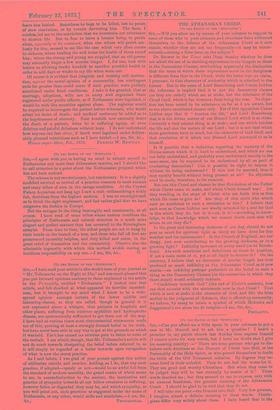THE ATHA.NASIA.N CREED.
[TO THS EDITOR OF THE "SPECTATOR."]
SIRe—Will you allow me by means of your columns to suggest to some of those who in your columns and elsewhere have addressed themselves to the defence of the Athanasian Creed as it now stands, whether they are not too frequently—it may be uncon- sciously—raising a false issue on the subject ?
Dr. Brewer in the Times asks Dean Stanley whether he does not admit the use of as startling expressions in the Gospels as those in the Damnatory Clauses, overlooking apparently the distinction that the sense in which these expressions occur in the Scriptures is different from that in the Creed, while the latter lays no claim, I presume, to that character of authority which is attached to the former. But in the cases of Lord Beauchamp and Canon Liddon the inference is implied that it is not the damnatory clauses (as they are called) which are at stake, but the substance of the Creed itself, which is far, however, from being the case. No objec- tion has been raised to its substance, so far as I am aware, but to the above-mentioned clauses only. Yet of this opposition Canon Liddon says that it " touches the life," and Lord Beauchamp that it is the divine nature of our Blessed Lord which is at stake. Certainly a very solemn thing is at stake, and one which touches the life and also the nature of our Lord ; but it is not that which these gentlemen have in mind, but the character of God itself, and that revelation of it which our Blessed Lord conveyed to us in himse If.
Is it possible that a definition regarding the mystery of the Divine nature which it is hard to understand, and which no one can fully understand, and probably none understand exactly in the same sense, can be required to be understood by all on peril of everlasting damnation? Can it possibly be right to impose it without its being understood ? If this last be asserted, then it may equally benefit without being present at all ? No objection need be made, therefore, to its removal.
But can this Creed and clauses be that Revelation of the Father which Christ came to make, and which Christ himself was? Are they treading in the steps of Christ who set forth this as that which He came to give us? Are they of this spirit who attach such an anathema to such a revelation as this ? I believe that such men as Canon Liddon are wholly actuated by a zeal for God in this which they do, but is it—oh, is it i—according to know- ledge, to that knowledge which we cannot doubt such men will attain to ere they die ?
In the great and increasing darkness of our day, should we not pray as much for spiritual light as lately we have done for fine weather and for missionaries ? Is the Church of England, are her clergy, just now contributing to the growing darkness, or to a growing light ? Infidelity increases on every hand (aa to Revela- tion). Are such assertions and definitions as those in question, if not a main cause of it, yet at all likely to remove it ? On the contrary, I believe that no document of similar length has ever produced so much infidelity as the Athanasian Creed as it now stands,—an infidelity perhaps preferable to the belief in such a thing as the Damnatory Clauses (in the connection in which they there stand) would evidently indicate.
" Confidence towards God" (the end of Christ's mission), how can that co-exist with the statements now in that Creed ? That which is now at stake is the character of God, and like the false mother in the judgment of Solomon, that is offered up innocently, we believe, by many to retain a symbol of which Moloch's and Juggernaut's are alone the fit temples.—I am, Sir, &c., PRELATIIS.


































 Previous page
Previous page